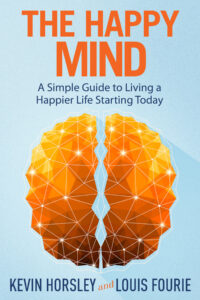Living Happier Starting Today by Kevin Horsley and Louis Fourie (Book Excerpt)
 CHAPTER 2
CHAPTER 2
HAPPINESS IS…
THE FUNDAMENTAL FLAW IN SEARCHING for happiness ‘out there’ lies in confusing pleasure for happiness. This basic misperception leads to the belief that happiness is either a once-in-a-lifetime-delight, or the compound effect of many, more, or bigger ‘pleasurables’.
There is, of course, a place for pleasure. In fact, pleasurable moments and uplifting experiences are the spice of life. Make sure that you fully enjoy the ones you choose. Just understand that their effect wears off. Pleasure cannot be hoarded and then called happiness.
True happiness is not a derived outcome of the swings in a ‘pendulum of pleasure’. Happiness is the quality of the base on which the pendulum is mounted. It is not the reward of constant that-instead-of-this victories, but an overall rhythm in the way you live your life – a rhythm that applies in any context you find yourself, pleasurable or not. Although the ‘if-then’ notions of happiness are dominant and loud out there, the truth is that genuine happiness is a ‘now-and-here’ skill. It is the by-product of a specific way of living your life. It’s not on the horizon, it’s under your feet – not to be found ‘up there’, but ‘down here’. It’s not dessert, it’s the meal!
Revisit your original beliefs about happiness again – those first thoughts you wrote down. Are your initial perceptions about happiness associated with enough ‘now-and-here’ ideas to your liking? How big is the shift you need to make in your definition to move your personal happiness from ‘out there’ to ‘in here’?
What are the mutual traits shared by happy people? In other words, if happiness is the offshoot of a pattern of conduct and not simply an assortment of ‘highs’, what are the underlying features to the pattern?
All our research, interactions and observations, have led us to conclude that happy people share nine common qualities:
- They think in a different way
- They assume full accountability for their circumstances
- They enjoy simple things more
- They own up to their future
- They are passionately engaged in what they do for a living
- They invest in their overall wellness
- They have constructive relationships
- They harness an optimistic world view
- They accept that happiness is a day-to-day effort
You may get the ‘chicken and egg’ feeling when you look at the list. Is this what happy people do, you may ask, or is this what people do to be happy? The truth is that it’s a fair portion of both. Applying these principles in your life feeds happiness, but they also come easier for people who commit to their own happiness. It doesn’t really matter which comes first; what does matter is that these principles are embedded in the lives of people who are happy with who they are and with the lives they have chosen to live.
Let’s pause for a moment and briefly reflect upon each of these happiness traits.
- HAPPY PEOPLE THINK IN A DIFFERENT WAY
Happy people view life through a productive window. The general way in which they give meaning to every-day information and events is not tarnished by fantasies of personal threats or portrayals of what is amiss. They empower themselves with an enabling perspective on matters instead of settling for the ‘downside’. They get out of the way of true answers and support lasting solutions, even though it may not be ‘their’ answer or solution.
The ancestor of every action in your life is a thought process. How we think is how our lives work out. Our reality over time mirrors the way in which we choose to make sense of life. We structure our lives in our heads.
Happy people often appear to be fortunate. However, when you examine the pattern according to which they decode life, you realize their good fortune starts in their minds. They live more harmonious lives because they don’t think in contradictory or conflicting patterns. The lens through which they define life isn’t scratched. They don’t burden their minds with a hunger for superiority, but invite, allow and comprehend any information, accommodate more opinions, and consider alternative suggestions. They aren’t ‘at war’ with life or set in their own ideas of ‘how things should work’.
The way in which we consider and work with information in our minds influences both the visible and invisible quality of our energy. The energy we carry originates in our heads. Happy people are energy-rich. They subject their anxieties to the authority of reason, oppose them through a spirit of compromise, and diminish them by living in peace. It allows them ease of progress in every endeavor, and they naturally do what should be done without the energy erosion accompanied by inner resistance and panic. They have an ability to accept objective solutions, as their assumptions are prejudice-lite.
Happy people are for solutions instead of being against problems. They carry a still power of abundance, because they don’t interpret life as a place of scarcity. Their welcoming disposition towards life affords them a remarkable sense of freedom and inner peace.
How productive is the nature of attention you give to life? Does your appraisal of the world energize or drain you (and others)? How many ‘enemies’ do you visualize ‘out there’, while they may actually be friends in the waiting? Are you open to new information and learning, or are your subjective positions blocking your growth? How dramatic is the movie playing out in your head?
- HAPPY PEOPLE ASSUME FULL ACCOUNTABILITY FOR THEIR CIRCUMSTANCES
Happy people don’t live in a protective bubble – they share the ‘winters and summers’ of life with all other mortals. They live under the same circumstances as less happy people – but choose to behave differently towards the ups and downs they are exposed to.
Happy people actively take charge of their circumstances. They refuse to be imprisoned by what happens to or around them. It seems much easier for them to counter the negative effects of unfriendly conditions, while they display the habit of making the most of favorable circumstances. All this simply because of an orientation towards life. They don’t rent their lives, they own them, under all circumstances. And their ownership extends to the cause, effect, and solution of an affair.
Research shows that circumstances can indeed play a role in a person’s overall happiness level, but that circumstantial adjustments are seriously overrated in terms of their impact on our long-term happiness. True, relief from extreme financial hardship, relationship problems, physical pain or environmental discomfort could have a notable effect on a person’s absolute level of happiness. But various studies have concluded that non-extreme, every-day situations don’t account for more than about ten percent of the variations in people’s happiness levels.
Our circumstances will always vary and always introduce unexpected moments. But if we really want to, we can easily manage most circumstances. Happy people believe this, and show they do by taking charge of the part they can control or utilize.
Happy and unhappy people ask different questions when an undesirable thing happens to them. Happy people ask, “What am I going to do about this?” and “How am I going to prevent this from happening again?” Unhappy people ask, “Why does this always happen to me?” or “Who is to blame for this?” In essence, happy people are willing to employ the power of choice and ownership while unhappy people opt for a sense of victimisation. Happy people work with life as it is, not as they wished it were.
All in all, our circumstances don’t determine the reality of our life experience – our attitude towards them does. If you have cynical, pacifying, or inhibiting thoughts about your circumstances, your reality will be negative. It has been said that the only difference between a weed and a flower is a judgement. The same life is constantly a flower for some and a weed for others – because of the attitude towards it.
Attitude is a mental orientation. It can support or obstruct you. Every thought about your circumstances you consciously confirm to be true, will multiply. Such a thought becomes a belief. The story of your life portrays these beliefs, as they shape new consequences. When you change your pattern of attachment to circumstances, you gradually change this mental construction, and you lay a new foundation of how you manage and shape your conditions. It’s a choice that offers freedom, but also a choice that needs to be backed energetically. Circumstances may originate externally – the extent of their effect on us is an internal affair.
How well do you manage circumstances and changes in your context? Do they overwhelm you time and again, or do you choose to manage them actively? Do you make things bigger than they are? Are you a victim, or are you an owner of the conditions surrounding your life?

For over 25 years, Kevin Horsley has been analyzing the mind and memory and its capacity for brilliance. He is one of only a few people in the world to receive he title International Grandmaster of Memory. He is a World Memory Championship medalist and a two-time World Record holder for The Everest of memory tests. Kevin authored four books and is the designer of a times table game with the Serious Games Institute at North-West University Vaal Campus. He is an International professional speaker and assists organizations in improving their learning, motivation, creativity, and thinking.
Visit:
The Happy Mind – Kevin Horsley
https://www.tckpublishing.com/
https://www.rememberimplement.com/
Tags: Finding happiness, kevin horsley















